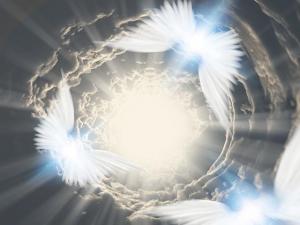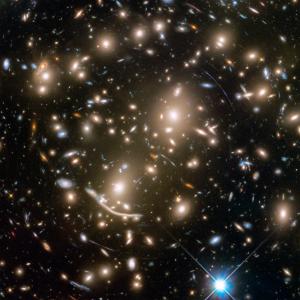
In several posts I have presented a picture of angels and devils that seems far from the ones I learned about in my traditional Catholic upbringing. I don’t believe my going from there to where I am now means leaving the faith. I’m a bit tentative about where I am with respect to angels, after all. I will conclude with some statements of what that tentative position is.
First, a more important question: Why get at all worked up about angels, enough to write six posts about them. Most of my adult life I couldn’t see much point in believing in angels. The faith seemed pretty much the same with or without them. Their impact on my life seemed non-existent. Angels could be interesting to speculate about. (How many angels can fit into one species? Only one according to medieval philosophers. Matter is the principle that distinguishes one member of a kind from another of the same kind. Each angel, a pure spirit without matter, would be its own species.)
Walter Wink, the Methodist theologian whose thought I have been following in these posts, gave the angels matter. Suddenly a new attitude made sense. It had been growing in me since I read in a prayer book about Fannie Lou Hamer and her struggle in the civil rights movement. She didn’t see herself fighting individual bad guys but “spiritual wickedness in high places.” Wink showed me that the “high places” weren’t a world apart populated by devils and, presumably, angels occasionally getting mixed up in affairs down here. Angels and devils dwell in the places where power is exercised on earth.
The domination system
Wink examined the ways power is exercised in society and found that it resides not so much in individuals as in institutions, ideologies, and other social artifacts. They are the context in which we live. They can make us as much as we make them. The New Testament calls them principalities, powers, thrones, etc. Paul says they were created in and for Christ, but they can easily become a system that dominates rather than sets free. Wink explains: They are fallen along with the rest of creation. I interpret:
That happens, i.e., the angels fall, as people turn to idolatry. We could join the song of the powers in praise of the creator and become creators ourselves, developing new takes on the powers we inherit. Instead, we let Power operate as a god, over us or in us over others. The domination system of men over women, adults over children, wealth over poverty, white over colored, “us” over “them” and all humanity over nature has its way.
The point, as I see it now, of angels and devils is that the struggle for justice in this world is not primarily against individual bad actors but against the larger-than-life forces that would remake all of us in their image. When the fight is less for individual rights in the same old system and more for changing the system itself toward life-giving instead of dominating, then, Wink says, we are instructing the fallen powers in the ways of God. Jesus showed us that God’s ways are not the ways of power.
Where are the traditional angels?
I could not just replace traditional angels with what Wink calls the “within” of social structures. I could not limit angels to the small area where humans operate. Angels must be independent of us, though not independent of the material world God made. So I turn to another theologian. Catholic theologian Karl Rahner believes that
angels are principalities and powers of the cosmos. He rejects the human-like picture of angels that we can easily take from Scripture’s stories of angels. But he says they are “conscious (and therefore free and personal) created, finite principles of the structure of various parts of the cosmic order.” He even claims that we can have natural, though not scientific, experimental knowledge of them. Finally, he says they can be “antagonistic” to us. (Parapahrased from George J. Marshall, Angels … Bibliography, p. 327)
Angels are “principles” but also “personal,” at least in some sense of the word. When we think of angels as persons, we need to realize that we don’t understand the idea of person very well. The traditional definition, “an individual substance of a rational nature,” is not satisfactory. Why “individual substance.” Modern thinking (and traditional intuition) sees being in relation as more basic than being an individual thing. I am not some thing “in here,” inside this body.
It’s a thought that fits well with modern theoretical physics, which understands the basic elements of the universe by their interactions. Whatever the mystery that makes me a person, we shouldn’t deny it to angels just because their bodies are more scattered than ours. Looked at another way, if the universe doesn’t have something personal about it, how does that feature crop up suddenly with us?
Non-traditional angels
I do regard angels, with the tradition, as persons, but in other ways my picture of angels and devils is not so traditional. I don’t believe that angels were created—and some of them fell and became devils—before the universe appeared. Again I get some support from Karl Rahner, who says,
All that is taught as really a matter of dogma is the existence of a spiritual creation consisting of angels.
And,
As regards the ‘time’ when the angels were created, … in view of the cosmic function of the angels, it is quite meaningful to think … of a simultaneous creation of the angels and the material world.” (Sacramentum Mundi (pages. 7 and 10)
Angels’ “natural superiority” to human beings is not dogma, Rahner says. We can have natural, though not scientific, experimental knowledge of them.
Non-traditional devils
As regards fallen angels, my ideas also vary a bit from the traditional. I don’t imagine a cohort of spiritual beings who established themselves as enemies of God, devils, in a one-time irrevocable decision, while other angels, by an opposite decision, remained irrevocably on God’s side. Perplexingly, Rahner does speak about such a decision determining angels’ fates and also contributing to our “situation in the history of salvation.” (p. 12) But he also says angels “do not merely intervene in the world by arbitrary decision … in certain cases out of sheer malice.” (Sacramentum Mundi, p. 11) I don’t know how those two statements can fit together. If some angels have become God’s enemies once and for all, it seems they would be operating out of “sheer malice.”
Elsewhere Rahner describes “supra-human and relatively personal principles of wickedness” in a way that makes more sense to me. First, they are only relatively personal. I interpret: They are personal only by relation to some genuine persons. Second,
They are not God’s rivals, but his creatures. And as with man, even evil freely chosen in a definitive state is the purely relative corruption of a natural, permanent being who has a positive function in the world; for something absolutely evil would be self-contradictory. (SM, p. 13)
Interpreting again, even a devil has a positive function in the world, if “he” could only become uncorrupted and get back to doing it. That can happen, Wink says. The principalities and powers, the spiritual rulers of this world, can be taught. It’s our job to teach them. If in doing so we meet violence with non-violence and love, we change the domination system of the world.
A very traditional salvation
I grew up with a personal idea of salvation. It was my most important job, I thought, to make sure my soul went to heaven when I died. That is not the Bible’s idea of salvation. It’s not what Jesus came to accomplish. The salvation Jesus offers is for the whole world that fell. Just as Jesus’ risen body is the same one that was once in the tomb, only now glorified, so our world of corrupt power and familiar misery awaits its own renewal and glorification.
If we are saved as persons, it’s as persons in relation to other persons and to a whole world. There are no other persons and no world except a world of relations.
Some more or less tentative belief statements about angels:
- Angels and devils, in the limited sense of whatever it is that exists across various manifestations in cosmic realities and human creations are real. This belief is more philosophical than religious.
- Angels are spiritual persons existing independently of us, but not in a far-off world of their own. They are essentially related to their material manifestations.
- Angels don’t explain how their physical manifestations work or come to be. Rather, they simply are. A nation or ideology or a work of justice or art participates in the being of its angel.
- Religious traditions about angels interpret experience, and no interpretation (for instance, statement 1) is final or exhaustive. I can’t explain how angels could be persons, but interpreting is different from explaining, and both are paths to truth.
- Traditional stories about angels go contrary to human expectation. People meet angels and fall down on their knees in fear. The angel says, “Fear not.” That part is unexpected, whether in an ancient world that worships many gods or in the modern world, where we kneel before the powers of the domination system. Angels don’t exert power. So I’m willing to credit the stories as being in touch with something real. I wish we had more stories like that.
- Devils are powerful with the power that we give them. A devil happens when we take something good and make it into a god. Sin is basically idolatry. In the stories devils say exactly what you would expect: “Fall down and worship me.” Such a story, like the temptation of Jesus in the desert, is, indeed, in touch with something. It’s the pull of the many things that all the rest of us make into our false gods.
- Human beings only are responsible for evil, but not each human being in isolation. The snake in the Garden of Eden symbolizes human freedom is not absolute; human intelligence is often cloudy. We fall down before the altar of a false god that looks for the moment like something true. That is the origin of the evil principalities, powers, and whatever other dark rulers of this world there are, and that is the source of their power over us.
- Angels sing God’s praise, not their own, and the created world joins their song. This is being rather than doing—being the song, being love, being knowledge, being virtue, being beauty. Angels don’t cause our song. Our song participates in theirs when it’s a song of love, knowledge, virtue, or beauty.
The armor of God
Worshiping the true God means not worshiping false gods, refusing to turn angels created good into demons. Some say that atheism is very much like Christianity because the atheist disbelieves in all the same gods that the Christian disbelieves in—and one more. Atheism, they say, completes the journey of disbelief that Judaism and Christianity began. That is to misunderstand the way the Jewish prophets and Jesus related to the false gods. They didn’t disbelieve in and ignore the false gods; they fought them. Their descendants in worshiping communities still do.
It’s a real battle, and we’re not very good at it because these are not just enemies out there; they get inside us, even to the point of being the thoughts that we think with. That’s what’s so important about another traditional idea: We don’t fight this battle alone. Jesus, tells us something about the armor and weapons we will find useful in this fight. They make for an odd sort of strategy.
Image credit: The Christian Broadcasting Netework via Google Images












